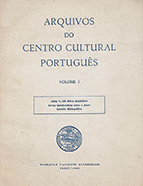

................................
It is important to remember that the initial aim of this publication was to feature studies on history, literature, and art, both in their autonomous and comparative forms, with a focus on the human sciences as its exclusive domain. However, it was the art section that ultimately fell short. As for the doctrinal part of the journal, we can observe that until 1977, there was a significant diversification of topics covered. Although literature was always a core area of the journal, during this period, articles were also published on subjects such as the history of the book, overseas history, religious history, the history of ideas, music history, and the history of art. However, from 1978 onwards, with a few exceptions, literary themes increasingly dominated the publication. In some volumes, literary content made up more than 50% of the work, leading to a decrease in the diversity of historical themes explored.
Around 44% of the journal's contributors were Portuguese, followed by 35% from France. This diversification was evident as early as 1979, when the then editor, José de Pina Martins, explained the preference for a larger number of Portuguese contributors, followed by a significant number of French researchers. This decision reflected the journal's Portuguese origin, despite being based in France. While the majority of contributors were from Portugal and France, there were also contributions from scholars of Portuguese culture from a variety of other countries, including Brazil, Spain, the UK, Italy, and others. Occasional contributions came from authors of diverse nationalities, such as Algerian, Armenian, Turkish, Polish, Belgian, Chinese, Israeli, English, Dutch, Romanian, and German.
This shift in contributions had a noticeable impact on the language used in the Arquivos . While the journal accepted articles in several languages— Portuguese, French, English, and Italian— the most represented were Portuguese and French. Many of the contributors to this publication were Portuguese speakers, predominantly French-based but also including researchers from around the world. It is, therefore, unsurprising that the majority of topics in this publication focus on the history and analysis of literature, a privileged area for these scholars of Portuguese culture. This emphasis reflects the influence of various lectureships in foreign universities centred on literary studies.
This work is financed by national funds through FCT - Foundation for Science and Technology, I.P, in the scope of the projects UIDB/04311/2020 and UIDP/04311/2020.
